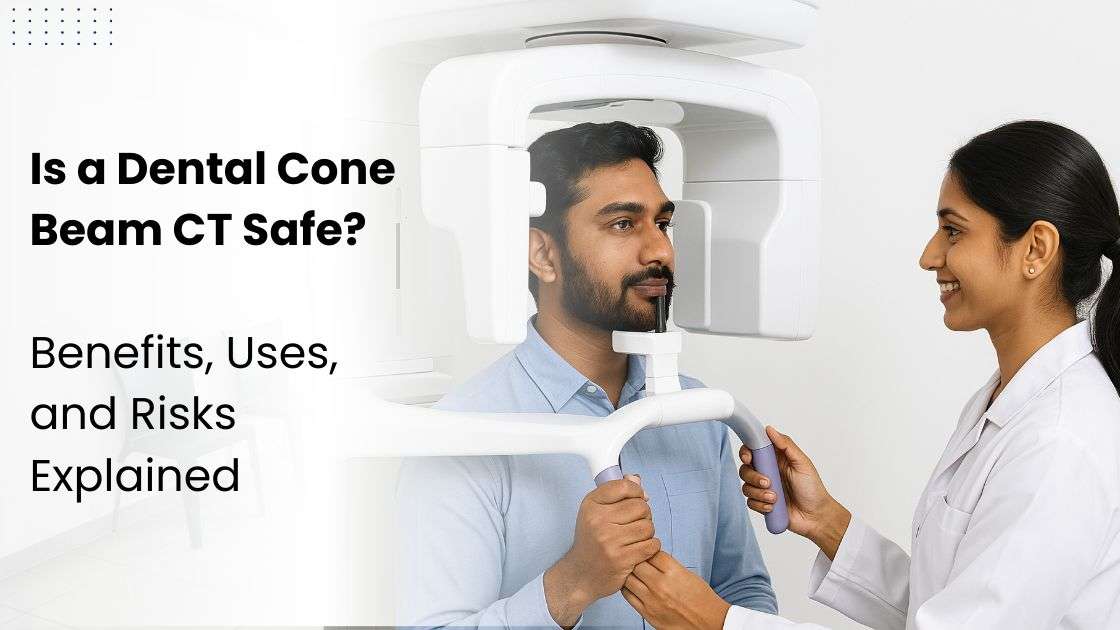Is a Dental Cone Beam CT Safe? Benefits, Uses, and Risks Explained

Dentistry has advanced rapidly over the last decade, and imaging technology has become a critical part of accurate diagnosis and effective treatment planning. One of the most significant innovations in this field is the Computed Tomography (CBCT) scan.
If your dentist has recommended a cone beam scan, you may be wondering: What exactly is it? Is it safe? And why do I need it? This article explains everything you should know about Dental Cone Beam CT scans — their safety, benefits, uses, and possible risks.
What is a Dental Cone Beam CT Scan?
A Dental Cone Beam CT (CBCT) scan is a special type of X-ray that produces three-dimensional (3D) images of your teeth, jawbone, gums, nerves, and surrounding structures. Unlike traditional 2D X-rays, CBCT provides detailed cross-sectional views, making it much easier for dentists to evaluate complex dental problems.
The machine uses a cone-shaped beam that rotates around your head, taking hundreds of images in less than a minute. These images are then combined to create a clear, accurate 3D model of your mouth and jaw.
Why Do Dentists Recommend a CBCT Scan?
Not every patient needs a Dental Cone Beam scan. Dentists usually recommend it when a higher level of detail is required for diagnosis or treatment. Common uses include:
- Dental Implant Planning – To measure bone density, locate nerves, and plan safe implant placement.
- Wisdom Teeth Extraction – To determine the exact position of impacted teeth and their relationship to nerves.
- Root Canal Treatment – To detect hidden canals, infections, or root fractures.
- Orthodontics – To assess jaw alignment and tooth positioning.
- Jaw Joint (TMJ) Disorders – To study the anatomy of jaw joints.
- Oral Pathology – To identify cysts, tumors, or bone abnormalities.
- Trauma or Injury Cases – To detect fractures and evaluate bone damage.
Benefits of Dental Cone Beam CT
Dental Cone Beam scans are widely considered one of the most useful diagnostic tools in modern dentistry. Some of the key benefits include:
- High Precision Imaging – Provides clear and detailed 3D views.
- Better Treatment Planning – Helps dentists perform procedures like implants or surgery with higher accuracy.
- Quick and Comfortable – The scan takes less than a minute and is completely painless.
- Lower Radiation Than Medical CT – Radiation exposure is higher than a regular X-ray but significantly lower than a hospital CT scan.
- Enhanced Patient Education – The 3D images allow patients to clearly see and understand their oral health condition.
Are Dental Cone Beam Scans Safe?
Yes, Dental Cone Beam scans are generally safe. The radiation dose is higher than a traditional dental X-ray but much lower than a medical CT scan. Dentists recommend CBCT only when it is necessary for diagnosis or treatment planning.
Precautions:
– CBCT is avoided during pregnancy unless absolutely required.
– Dentists use the ALARA principle (As Low As Reasonably Achievable) to ensure radiation exposure is minimal.
Dental Cone Beam vs. Traditional Dental X-rays
| Feature | Traditional X-rays | Dental Cone Beam CT |
| Image Type | 2D | 3D |
| Level of Detail | Basic | Highly detailed |
| Uses | Cavities, simple exams | Complex cases, implants, TMJ, pathology |
| Radiation | Very low | Moderate |
| Accuracy | Limited | High precision |
Advancements in Dental Cone Beam Technology
Over the years, Dental Cone Beam technology has improved significantly. Modern CBCT machines are designed to emit even lower doses of radiation, capture sharper images, and process scans faster.
Many clinics now use digital software that integrates CBCT results with 3D treatment planning tools, making procedures like implant placement, orthodontic corrections, and surgical treatments more predictable and successful. These advancements make CBCT an indispensable tool in modern dental care.
Conclusion
A Dental Cone Beam CT scan is one of the safest and most effective diagnostic tools in dentistry today. It allows dentists to plan treatments with precision and ensures patients receive care that is both safe and effective.
If you’re looking for advanced 3D dental imaging in Bangalore, Sakthi Smile Craft offers state-of-the-art CBCT scans to support accurate diagnosis and treatment planning. Their modern facilities and experienced specialists ensure patients get the highest standard of care.
Learn more here: https://sakthismilecraft.com/3d-ct-scan/
For those who want to explore more about the science and technology behind Dental Cone Beam systems, you can refer to this detailed resource on Cone Beam Computed Tomography (CBCT).
It explains the origins, principles, and applications of CBCT technology in dentistry and other medical fields.
Frequently Asked Questions (FAQ)
Is a dental cone beam scan painful?
No, the scan is completely painless. You simply sit or stand still while the machine rotates around your head.
How long does a CBCT scan take?
The scanning process usually takes 20–40 seconds.
Is CBCT safe for children?
Yes, when recommended by a dentist. Radiation exposure is kept minimal, and it is used only when necessary.
How much does a dental CBCT scan cost in India?
The cost varies depending on the city and clinic but usually ranges between ₹2,000 – ₹6,000.
Can I eat or drink before a cone beam scan?
Yes, there are no restrictions. You can eat, drink, and continue your routine normally before the scan.
